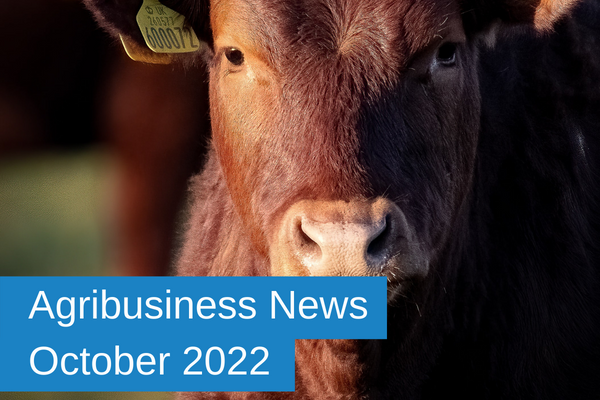Agribusiness News October 2022 – Beef Contracts
30 September 2022Beef contracts – Is now the right time?
With increased input prices, particularly fertiliser and feed, the margins in beef production continue to be squeezed with many producers questioning the viability of their beef finishing enterprises.
Whilst some producers will have had reasonable returns for their financial year ends in 2021 due to the higher beef prices coupled with lower input costs; the outlook for 2022 does not look to be as positive. With the rises in variable costs to record levels it is very difficult to draw up a budget for finished cattle when the end price is just an estimate.
Cull cow values have also seen record highs this year, leading to fears from the processing sector that prime cattle numbers will decline in coming years and there is a limitation to the amount of beef from the dairy that can be produced to fill this potential gap.
So, is now the time to ask the questions around having a forward pricing strategy for beef? If processors are that concerned about where their beef supply is coming from and retailers are all putting pressure on their supply chains to work towards net zero, would it not be beneficial for suppliers to have an incentive to produce beef?
What kind of contract?
Fixed price
This gives the producer a level of confidence and allows accurate budgeting to be done. This would be particularly beneficial for longer keep cattle that are perhaps, the biggest gamble for producers.
Minimum price
Knowing where the bottom is in the market is essentially what a minimum price contract would do. If the spot price is above that, you receive more that agreed contract price and if the spot price moves below the agreed price, you are cushioned from that drop below the agreed price.
Cost of production
In a similar way to some of the retailer aligned milk contracts cost of production contracts require the producer to ‘open their books’ up to the processor/ retailer and share their cost of production and agree on margin above that.
Whilst with all types of contracts understanding your own costs is the only way you will know if the contract price will be beneficial to you or not; cost of production contracts can sometimes be challenging. If costs rise like they have this year, and the contract does not allow for change then the producer will have to absorb those price increases.
Challenges
Many producers are concerned that by signing up a proportion of their cattle to a contract they are effectively letting the processors know what cattle are in front of them and giving them the opportunity to reduce the spot price.
Producers also have concerns that if a better price is achieved through a contract that often the grades of the cattle may be impacted, resulting in the value of the cattle being reduced.
On the other side, if the spot price is better than the fixed contract price producers may seek a way out of the contract as they feel it is only beneficial to them when the contract price is better than the spot price.
Contracts may be a way to incentivise the type of cattle the processor or retailer would prefer so producers must be willing to meet those tighter specifications in order to gain the benefit of the contract.
By building up better communication and trust in the supply chain some of these concerns may be overcome and would perhaps establish a more sustainable beef supply chain than the current one.
Sign up to the FAS newsletter
Receive updates on news, events and publications from Scotland’s Farm Advisory Service

